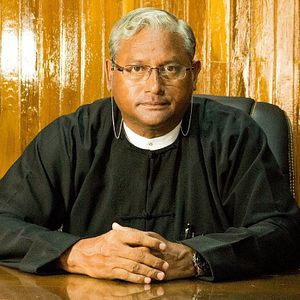A court in Myanmar sentenced two men to death on Friday for the killing of a prominent Muslim lawyer who was a close adviser to the country’s leader, Aung San Suu Kyi.
The Yangon Northern District Court found Kyi Lin guilty of premeditated murder and illegal weapons possession in the January 2017 shooting of Ko Ni at Yangon’s airport. The court also sentenced to death another man for helping to plan the killing, and gave prison sentences to two other men it said were also involved in the crime. A fifth suspect accused of being the mastermind remains at large.
The convictions came amid growing scrutiny on Myanmar’s domestic politics ahead of upcoming elections expected in 2020, including how the country and the ruling government led by Suu Kyi are contending with issues related to democracy and human rights.
Ko Ni was shot in the head at close range on January 29, 2017, as he walked out of the airport after returning from a working trip to Indonesia. Surveillance video showed he was shot near a taxi stand as he held his 5-year-old grandchild.
Onlookers chased down the gunman, catching him only after he fatally shot one of them, a taxi driver. Kyi Lin, who had been previously imprisoned for illegal trade in antiquities such as sculptures of Buddha, also received a 20-year sentence for killing the taxi driver.
Death penalties in Myanmar are carried out by hanging, but no executions appear to have been conducted since 1988. Many prisoners on death row have had their sentences commuted.
“Despite today’s verdict, serious questions remain about whether all those responsible have been brought to justice,” the human rights group Amnesty International said. “This long and tortuous trial has done little to bring light to the assassination of one of the country’s most prominent lawyers.”
Speculation about the motive focused on two possibilities.
Ko Ni was noted for criticizing army interference in politics and advised Suu Kyi’s National League for Democracy party on ways to get around articles in the army-imposed constitution that give the military wide powers even after Myanmar’s transition to democracy. Her party circumvented a ban on her becoming president by creating a new executive post, state counsellor, with presidential powers.
The fact that two of the defendants are former army officers fueled theories that the military was involved in the crime, an accusation it denies.
As a prominent advocate for the Muslim minority in overwhelmingly Buddhist Myanmar, Ko Ni was also a target of abuse from ultranationalist Buddhist monks and their allies, some of whom publicly gloated after his death.
Myanmar has been gripped by anti-Muslim sentiment in recent years after deadly communal violence in the western state of Rakhine, home to many Muslims from the Rohingya ethnic minority. The violence skyrocketed in August 2017, when security forces responded brutally to attacks by Rohingya rebels, eventually driving about 700,000 Rohingya villagers across the border into Bangladesh in what many human rights activists charge was a case of ethnic cleansing.
Home Affairs Minister Lt. Gen. Kyaw Swe said during the investigation of Ko Ni’s murder that authorities believe it was a “personal grudge” and “extreme sense of nationalism” that motivated the suspects. Police said the murder plot was hatched around April 2016, and Kyi Lin was hired to be the gunman and reportedly was paid almost $60,000.
A separate statement issued at the time by the president’s office urged people “to be fully aware of religious and racial incitements, and attempts to destabilize the situation,” an apparent reference to speculation that anti-Muslim prejudice might have contributed to Ko Ni’s death.
The second man sentenced to death Friday was Aung Win Zaw, who appeared in surveillance video at the airport on the day of the killing.
Another alleged planner, Zayar Phyo, who told the court he had been framed, received a five-year prison sentence, while Aung Win Tun, charged with harboring one of the suspects, was given three years.
The alleged mastermind, Aung Win Khine — also known as Aung Win Khaing — was charged with premeditated murder.
Myanmar has asked Interpol, the international police agency, to issue a “Red Notice” informing its members that a warrant has been issued for his arrest and requesting that he be held for extradition.
By Associated Press with additional reporting from The Diplomat.
































